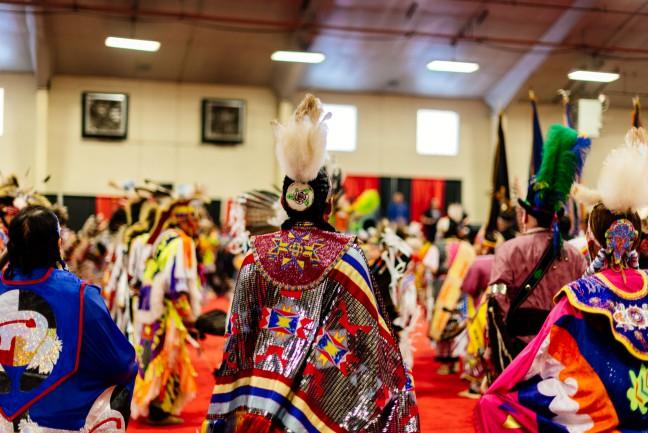Native American students at the University of Wisconsin are celebrating Native November — a heritage month that both celebrates indigenous culture and recognizes the ongoing struggles of Native people on campus and beyond.
Student organizations like Wunk Sheek and the Alpha Pi Omega sorority organized a variety of educational and cultural programming throughout the month like beading workshops, film screenings and a panel discussion.
Wunk Sheek external relations officer Collin Ludwig said Native November is important because Native Americans are often forgotten by the white majority.
“We’re the minority of the minority on campus, so it’s important that we get that recognition,” Ludwig said. “That we’re still here and we’re still practicing our traditions and our culture.”
But heritage month celebrations don’t dismiss the fact that Native students like Ludwig feel a lack of support from the campus community.
Ludwig recalled an incident a few years ago at the Dejope fire circle when students yelled stereotypical “war chants” out of their dorm windows during a ceremony for missing and murdered indigenous women.
Last year on Indigenous Peoples’ Day — which deliberately coincides with Columbus Day — someone also vandalized the Dejope fire circle by spray painting “Columbus Rules 1492.”
Ludwig said the university partnered with the Ho-Chunk nation in building that space. But after this incident, Ludwig said the university responded with a “cookie-cutter apology.”
“We have to deal with racism from students and faculty members and that’s constantly on our minds,” Ludwig said. “We have to think about that and deal with it and take a lot of time from ourselves — especially emotional time and emotional labor.”
UW spokesperson Meredith McGlone said the university is taking steps to improve campus climate for Native students and other underrepresented groups. Recently, the university launched the Elders-in-Residence program, which brings Native community leaders to campus.
The Alpha Pi Omega sorority organized a panel discussion on indigenous identity in higher education. The panel featured UW alumni like UW Native American student success coordinator Sasanehsaeh Pyawasay.
“These structures weren’t built for native folks,” Pyawasay said.“These higher education and high schools were originally built for wealthy white men. So how do you navigate in that space and help bring students along — particularly native students?”
To help Native students navigate through culture shock at the university, Pyawasay said there needs to be more of an effort to build community.
“We’re all different, we all come from different communities and different families — but this is an opportunity for you to really get together and learn about each other,” Pyawasay said.
Fellow panelist and Menominee tribal legislator Gary Besaw said that while he often speaks with humor, that doesn’t dismiss the fact that Native people have had to live through many atrocities.
In the audience was Mark Denning, who lost two children to suicide in 2016. Denning’s daughter Isabel Denning sought support from University Health Services for her brother’s death, her experiences with sexual assault and the general anxiety she felt about life at UW.
Denning was told by the provost’s office that the university will do things differently and support native students following his daughter’s passing. After asking what’s changed since 2016 to the students in the audience, Denning was met with silence.
But in response, Alpha Pi Omega vice president Melissa Besaw said she too felt lost when she came to UW. It led her to the sorority and Wunk Sheek where she found a strong support group of Native students.
“I found a lot of support in these organizations,” Melissa Besaw said. “But I think it depends on the students that are in leadership, but I would say now that there’s a definite improvement.”
SSFC approves Wunk Sheek budget, hears Live Free presentation
To address concerns that the university does not have enough culturally competent health services for Native students, McGlone said UHS has launched multiple initiatives.
UHS is working to educate their staff on providing culturally appropriate care to Native students in collaboration with experts from the Native community, McGlone said. UHS also plans to recruit mental health providers with experience in working with Native students.
While it’s admirable that Native students were able to build spaces for themselves, Pyawasay said this responsibility shouldn’t fall on the students who are simply at the university to gain an education. Instead, staff and faculty should be the ones to improve the campus climate for Native students.
The Multicultural Student Center has hired an undergraduate campus community organizer to help coordinate communication and community among Native students, McGlone said.
“There are other things on our mind that we need to worry about,” Ludwig said. “That should be taken into account, and that wasn’t the case for Isabel. We want to make it better for other native students so that doesn’t happen again.”


